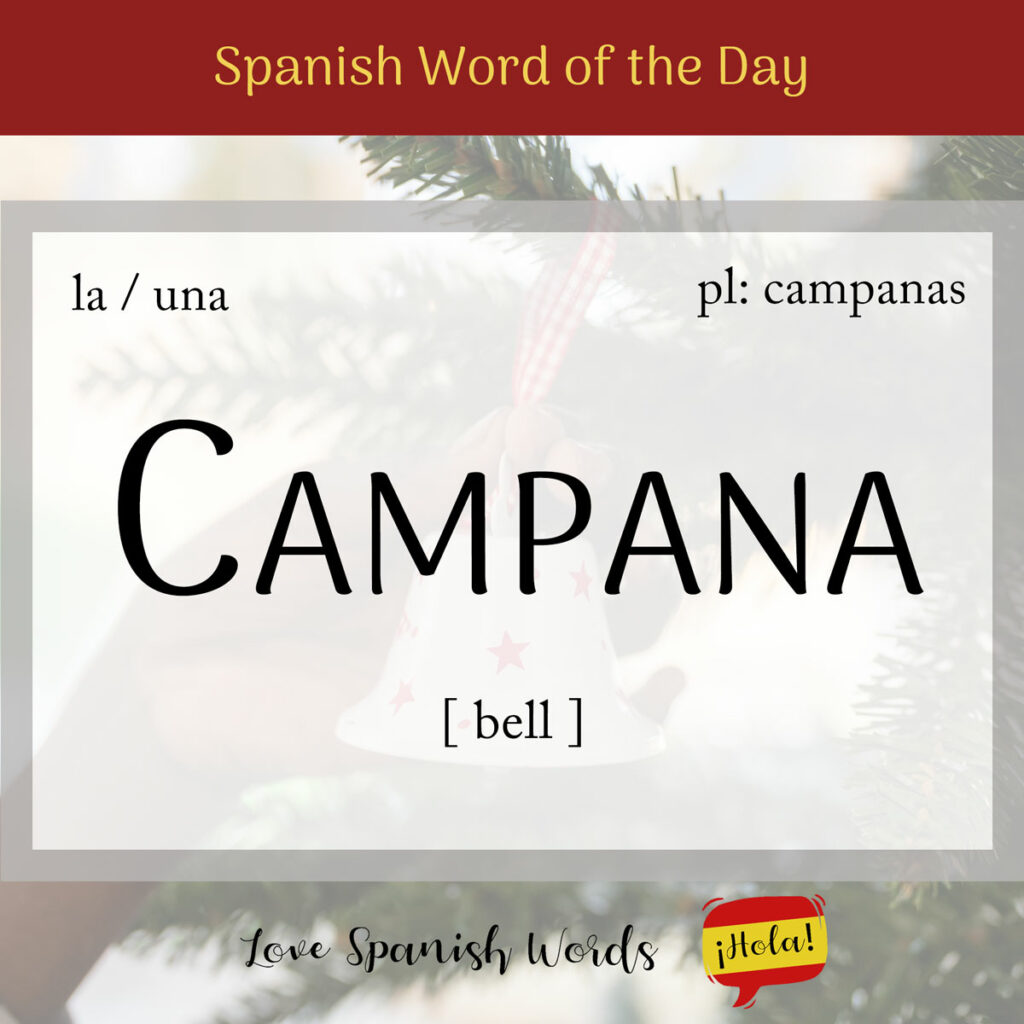Bells can be found in schools, churches, clocks, trains, and many different places to tell us about the passing of time, to mark time, or to signal something to us. Today, we are going to look at the Spanish word campana, meaning bell in English. The word comes from the Latin word campāna, which means bell or cup-shaped vessel.
Latin American Pronunciation
European Pronunciation

Campana is a feminine noun and it takes the following definite and indefinite articles:
- la campana = the bell
- las campanas = the bells
- una campana = a bell
- unas campanas = some bells
Podíamos escuchar la campana del reloj desde lejos.
We could hear the clock bell from far away.
Campanas are typically large instruments that produce a sonido (sound) when struck. They are used to signal specific times and events, but they serve different purposes. Let’s look at a few.
Campanas (bells) often serve to mark specific times or eventos (events). For example, a bell might ring to signal waking up or mealtime. In schools, it marks the time to change classes. In a religious context, campanas may announce tiempos de oración (prayer times). Bells are also used to comunicar mensajes (communicate messages). For instance, in small towns and villages, a bell might ring to announce a muerte (death), an emergencia (emergency), or even la llegada de alguien (someone’s arrival).
Similarly, a campana may be rung as an alerta (alert) or advertencia (warning), specifically in the workplace where there could be danger. Emergency bells are placed to warn people of a fire or urgent situation. Work environment often place fire alarms or alarm bells as a precaution.
Campanas may also be used for celebratory events, such as bodas (weddings), New Year’s, and Christmas celebrations.
El pueblo tocó la campana para anunciar la muerte del alcalde.
The town rang the bell to announce the death of the mayor.
Famous campanas around the world:
- La campana de la Libertad = Liberty Bell: This bell is found in Philadelphia, USA. It is a well-known symbol of independence and freedom.
- La campana de la Catedral de Sevilla = The Bell of the Seville Cathedral: It is one of the most famous and historic bells in Spain.
- Big Ben = Big Ben: A bell found in the Elizabeth Tower in London, England. It is a clock and a bell that weighs 13 tons and rings every quarter of an hour.
- Las campanas de Notre-Dame = The Bells of Notre-Dame in the Cathedral found in Paris, France are used for religious and ceremonial purposes.
- La campana de Dolores = The Mexican Independence Bell: found in Mexico City, Mexico is a symbol of Mexico’s independence from Spain and is rung every year on Mexican Independence Day.
La campana de la Libertad en Filadelfia es un símbolo importante de la independencia de los Estados Unidos.
The Liberty Bell in Philadelphia is an important symbol of the independence of the United States.
There are many types of campanas. Below are some of the most common:
- campana de iglesia = church bell: used for call for prayers, religious events, to announce weddings, and deaths
- campana de reloj = clock bell: found in clock towers or town halls and ring on the hour to signal time
- timbre = doorbells: are small devices placed at the entrance of a home or building to alert the homeowner of visitors
- campana de viento = wind chime: small, decorative bell made of metal or ceramic to produce a soft sound when the wind blows
- campanillas = hand bells: small portable bells that can be used in music or to signal something. Teachers usually use these in class to call for attention.
- campana de escuela = school bell: used to signal the start and end of classes, breaks, and other transitions throughout the day
- campana de alerta o emergencia = emergency bell: used in buildings, ships, workplaces, to alert people of an emergency or danger, such as a fire, safety issue, or evacuation
- cencerros = cowbells: a bell that is worn around the necks of livestock to help farmers keep track of them and hear them at a distance
- cascabeles = sleigh bells: bells associated with the holidays and used for Christmas décor, or horse drawn sleighs
- campanas de tren = train bells: these bells sound to signal and alert pedestrians and vehicles about the approach, departure, or stopping of a train
- timbre or campanas de bicicleta = bicycle bells: small bells attached to bicycles to alert pedestrians, vehicles, and other cyclists about the rider’s presence
La profesora me llamó en clase, pero el timbre me salvó.
The teacher called on me in class, but I was saved by the bell.
Me encanta escuchar los cascabeles de trineo en las canciones navideñas.
I love hearing the sleigh bells in Christmas songs.

Spanish metaphors featuring ‘campana’
The following phrases are used metaphorically:
La campana de la justicia which means “The bell of justice,” refers to a moment when something is judged or decided.
Su campana sonó means “His/her bell rang,” and it refers to the end of someone’s life, career, or term. This phrase can be used when talking about someone’s death or when someone leaves a job.
El sonido de la campana, means “The sound of the bell,” which symbolises the lingering sound or echo that is ongoing from bells. This sound usually evokes memories, for example when remembering Christmas bells.
La campana de la fe meaning “Bell of faith,” refers to the call of religious devotion or commitment. This can be use used when someone decides to dedicate their life to their new belief.
Campana de bodas (wedding bells) and Sonaron las campanas de boda (the wedding bells rang) doesn’t literally mean the bells rang but refers to the union of two people or a marriage taking place. You can use it when talking about someone’s marriage.
Spanish idioms featuring ‘campana’
Hacer campana
Literal translation: to do bell
English meaning: to skip class
A toda campana
Literal translation: with the entire bell
English meaning: to do something with a lot of noise or energy
Levantar campana
Literal translation: to lift bell
English meaning: to announce something or make a public declaration

